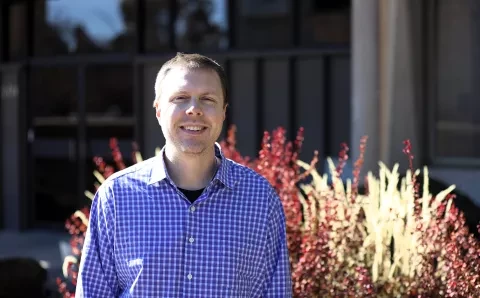May 5, 2025
Q: How do I know if my relationship with alcohol is unhealthy?
A: I knew my drinking was unhealthy by the time I was 17. I wasn’t even able to legally drink, but it was already a problem.
One night I realized I had been drunk every day for the past month. I thought, “What am I doing? This isn’t right.”
I wasn’t able to honestly work on what I needed to or change my drinking habits for at least four years. I thought I would be able to control it and somehow drink to a level of satisfaction that was safe. What I wanted my drinking to look like and what my drinking looked like were different.
I found out I wasn’t able to control it, and it took me a long time to ask for help.
If you’re starting to wonder about your drinking, or someone else’s, these questions might help. I wish someone had asked me these earlier. I think they could’ve helped.
What are the consequences of your drinking?
How is your physical health? Do you feel anxious or have panic attacks after drinking? Are your relationships being impacted? Do you call out at work because you’re too hungover? Are you too drunk to take care of your responsibilities?
More than anything, how do you feel about your drinking? Sometimes it’s easier to brush off our nagging thoughts if we haven’t hit a big “rock bottom” like a DUI or getting fired. But like Jordan said in a recent blog, sometimes it’s not about what’s happened—it’s just about how it feels. Trust your intuition.
Have you ever tried to quit drinking but couldn’t?
I think this is a really good question. A lot of us try quitting over and over again, sometimes for years, before we get help or find our own version of healthy.
Just because things have been tough before doesn’t mean there’s no hope now. And it might not even mean you have to quit drinking completely. Everyone is different, and there are lots of ways to ease into healthier habits. Even something as simple as having a glass of water with your drink could be a good place to start. Small changes can give you more control and help you feel a little better each day.
Please remember: If you’re thinking about quitting drinking, please seek medical advice. Quitting alcohol abruptly can be dangerous or even cause death.
Why are you drinking in the first place? What are your coping skills other than drinking?
Why do you drink? Are you celebrating? Are you trying not to feel something? Are you uncomfortable in social situations?
Are there hobbies or people that bring you joy when you’re feeling bad or restless? How often are you turning to alcohol to get by?
For me, I was trying to escape anxiety and boredom. I wanted to block out my reality. Eventually, my cravings were so bad that I drank to feel relief. My life and hobbies look so different now that I don’t automatically turn to alcohol when things get tough.
Have you wondered if you should cut back or stop drinking?
If you’re thinking about it, there’s a chance your drinking may not be healthy. Maybe the way you’re drinking is outside of your values, and that’s why you’re reading this.
Not everyone needs to give up alcohol completely to find a healthier balance. It didn’t work for me, but there are many people who can self moderate. Shannon, another peer coach, is one of them. You can read more about her alcohol journey in this harm reduction blog.
If you’re surrounded by people who drink like you, this can be even more confusing. But comparing ourselves to others usually does more harm than good. We don’t know what’s going on beneath the surface.
If you still have questions or doubts, we’re here for you. We’ll walk alongside you as peers, no judgment.

